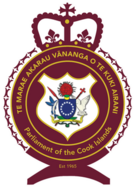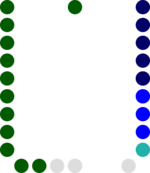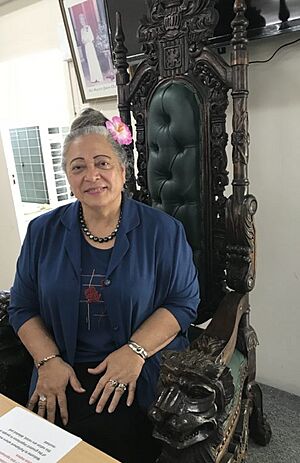Parliament of the Cook Islands facts for kids
Quick facts for kids Parliament of the Cook IslandsTe Marae Akarau Vānanga o te Kuki Airani |
|
|---|---|
| 18th Parliament | |

Official Emblem of the Parliament of the Cook Islands
|
|
| Type | |
| Type | |
| Leadership | |
|
Speaker
|
Tai Tura, Cook Islands Party
Since 22 March 2021 |
|
Deputy Speaker
|
Tuakeu Tangatapoto, Cook Islands Party
|
|
Mark Brown, Cook Islands Party
Since 1 October 2020 |
|
|
Leader of the Opposition
|
Tina Browne, Democratic Party
|
| Structure | |
| Seats | 24 |
 |
|
|
Political groups
|
Government (14)
Opposition (10)
|
| Elections | |
|
Last election
|
1 August 2022 |
|
Next election
|
TBD |
| Meeting place | |
 |
|
| Avarua, Rarotonga | |
| Website | |
| Parliament of the Cook Islands | |
The Parliament of the Cook Islands (Cook Islands Māori: Te Marae Akarau Vānanga o te Kuki Airani) is the main law-making body of the Cook Islands. It's like the country's biggest meeting place where important decisions are made. It started when New Zealand was in charge, and then became the official law-making group when the Cook Islands became independent in 1965.
The Parliament has 24 members. These members are chosen directly by people voting in elections. Everyone who is old enough can vote. Members serve for up to four years, until the Parliament is dissolved and new elections are held. The Parliament meets in Avarua, which is the capital city, located on the island of Rarotonga.
The Cook Islands uses a system of government called the Westminster system. This means the country is run by a group of leaders called the Cabinet and a Prime Minister. These leaders must have the support of most of the members in Parliament.
The person in charge of leading the Parliament meetings is called the Speaker of the House. Currently, the Speaker is Tai Tura. The Deputy Speaker, who helps the Speaker, is Tuakeu Tangatapoto.
Contents
History of the Parliament
The Parliament of the Cook Islands has changed over time. It began as the Cook Islands Legislative Council in 1946. This council was set up to help people in the islands have a say in their government. It could make some laws for "peace, order, and good government." However, it couldn't make laws that went against New Zealand's laws. It also had limits on how much money it could raise or what punishments it could set.
In 1957, the Legislative Council was changed and became the Legislative Assembly. It had more elected members. By 1962, this Assembly had full control over its own money. That same year, the Assembly decided that the Cook Islands should govern itself, but still have a special link with New Zealand. When the Cook Islands became independent in 1965, the Assembly gained full power to make all laws. In 1981, it was officially renamed the Parliament of the Cook Islands.
The number of members in Parliament and how long they serve has changed a few times since independence. In 1965, there were 22 members who served for three years. The number of members grew to 24 in 1981, and then to 25 in 1991. It went back down to 24 members in 2003. The term length also changed from three years to four years in 1969, and then to five years in 1981. In 2004, people voted to change the term back to four years.
Who Are the Members and How Are They Chosen?
The Parliament of the Cook Islands is similar to the British House of Commons. It has 24 members, who are called "Members of Parliament" (MPs). These MPs are chosen by voters in different areas, called constituencies. The person who gets the most votes in each area wins. This is called the "first-past-the-post" system.
Ten MPs are elected from areas on the main island of Rarotonga. Three MPs come from Aitutaki, and three from Mangaia. Two MPs are from Atiu, and one MP each comes from the islands of Manihiki, Mauke, Mitiaro, Penrhyn, Pukapuka, and Rakahanga.
The leaders of the Cook Islands government, known as the Cabinet, are chosen from the members of Parliament. The Prime Minister is the head of the government. The King's Representative chooses the Prime Minister from the political party or group of parties that has the most support in Parliament. The Prime Minister and the Cabinet stay in power until the next election, or if they lose the support of Parliament. The Cook Islands usually has two main political parties, but sometimes there are also members who don't belong to any party.
Currently, the Prime Minister is Mark Brown from the Cook Islands Party. The leader of the opposition, who leads the party not in power, is Tina Browne from the Democratic Party.
Results of the Last Election
Here is a summary of the election results from 1 August 2022:
How Laws Are Made
The Cook Islands Parliament follows a process similar to other Westminster systems for making laws. New laws are first suggested to Parliament as bills. A bill becomes a law, or an Act, after Parliament approves it three times and the King's Representative agrees to it. Most bills are introduced by the government. However, individual MPs can also suggest their own bills. One day each week is set aside for these bills.
Debates in Parliament are quite structured. There is no debate during the first or third readings of a bill. Sometimes, there might not be any debate during the second reading either. Members vote by voice or by dividing into groups. There is no way for a member to vote if they are not present.
First Reading of a Bill
The first step in making a law is the First Reading. The bill is officially presented to Parliament. The Clerk, who helps run the Parliament, reads out the short title of the bill. At this stage, there is no discussion or vote. For the First Reading, a bill only needs its short title.
Second Reading of a Bill
The Second Reading can happen up to a month after the first. Usually, there is a discussion about the main ideas of the bill. Members can speak for up to 20 minutes. If Parliament approves the bill, its full title is read. Then, the bill is either discussed by the whole Parliament as a committee, or it is sent to a smaller group called a Select Committee, or to the House of Ariki. If a bill is going to a Select Committee or the House of Ariki, the Second Reading is just a formality, and there is no debate.
Review by Select Committee or House of Ariki
Bills can be sent to a Select Committee or to the House of Ariki for a closer look. These committees or the House of Ariki usually have three months to review the bill. This time can be made longer if needed. Parliament can give specific instructions on what the committee or House of Ariki should focus on. After reviewing, the Parliament votes on whether to accept the committee's or House of Ariki's report. If the vote passes, the bill goes straight to its Third Reading. It doesn't need to be discussed by the Committee of the Whole House. Sometimes, the bill might be sent back to the Committee of the Whole for more discussion.
Committee of the Whole House
When a bill reaches this stage, Parliament becomes a "committee of the whole House." This means all MPs present work together as a committee to discuss the bill. Each member can speak up to three times on each part of the bill or any suggested changes. Each time they speak, it can be for up to 10 minutes. However, the discussion is only about the details of the bill, not its main ideas. The committee can change the bill as they see fit. These changes must be related to the bill's topic and the specific part being discussed. They also can't go against any parts that have already been agreed upon. Changes can be suggested during the debate or in writing. Once all parts have been discussed and changes agreed to or rejected, the bill is reported back. There is a final vote on whether the Parliament accepts the committee's report.
Third Reading of a Bill
The Third Reading can happen on the same day that a bill is reported back by the Committee of the Whole, the House of Ariki, or a Select Committee. Only small changes can be suggested at this stage, usually to fix mistakes. No big changes to the bill's content are allowed. There is no debate during the Third Reading. If the bill passes this final vote, it is sent to the King's Representative to be officially approved and become a law.
Special Committees
Laws are also carefully checked by special groups called select committees. Each committee must have between five and seven members. These committees can ask people to come and speak to them and can ask for documents to help with their work. Like in other Westminster systems, what happens in these committees is protected by special rules called Parliamentary privilege.
The Parliament has different committees that focus on specific topics. Here are some of them:
| Select Committee | What They Do |
|---|---|
| Commerce | Looks after business, trade, communication, energy, and money matters. |
| Education and Science | Deals with schools, training, research, and new discoveries. |
| Finance and Expenditure | Checks how the government spends money and collects taxes. |
| Foreign Affairs, Immigration, and Trade | Handles relationships with other countries, who can enter the Cook Islands, and trade. |
| Land, Local Government, and Cultural Affairs | Manages land, outer islands, local councils, and the culture and traditions of the Cook Islands. |
| Law and Order | Oversees courts, prisons, and the police. |
| Labour | Deals with jobs, work relationships, and safety at work. |
| Privileges | Looks after the special rights and protections of Parliament and its members. |
| Social Services, Health, and Environment | Focuses on housing, support for older people, welfare, public health, and protecting nature. |
There are also three other committees that help run Parliament itself:
| Select Committee | What They Do |
|---|---|
| Government Caucus Committee | Decides what Parliament will discuss each day and in what order. |
| Standing Orders Committee | Makes changes to the rules that Parliament follows. |
| Bills Committee | Deals with special bills that are not introduced by the government. |
Terms of the Cook Islands Parliament
The Parliament is currently in its 18th term. This means there have been 18 different groups of elected members since the Parliament was formed.
| Term | Elected in | Government |
|---|---|---|
| 1st Parliament | 1958 election | |
| 2nd Parliament | 1961 election | |
| 3rd Parliament | 1965 election | Cook Islands Party |
| 4th Parliament | 1968 election | Cook Islands Party |
| 5th Parliament | 1972 election | Cook Islands Party |
| 6th Parliament | 1974 election | Cook Islands Party |
| 7th Parliament | 1978 election | Democratic Party |
| 8th Parliament | March 1983 election | Cook Islands Party |
| 9th Parliament | November 1983 election | Democratic Party |
| 10th Parliament | 1989 election | Cook Islands Party |
| 11th Parliament | 1994 election | Cook Islands Party |
| 12th Parliament | 1999 election | Democratic Party |
| 13th Parliament | 2004 election | Democratic Party |
| 14th Parliament | 2006 election | Democratic Party |
| 15th Parliament | 2010 election | Cook Islands Party |
| 16th Parliament | 2014 election | Cook Islands Party |
| 17th Parliament | 2018 election | Cook Islands Party |
| 18th Parliament | 2022 election | Cook Islands Party |
See also
- House of Ariki
 | Ernest Everett Just |
 | Mary Jackson |
 | Emmett Chappelle |
 | Marie Maynard Daly |



